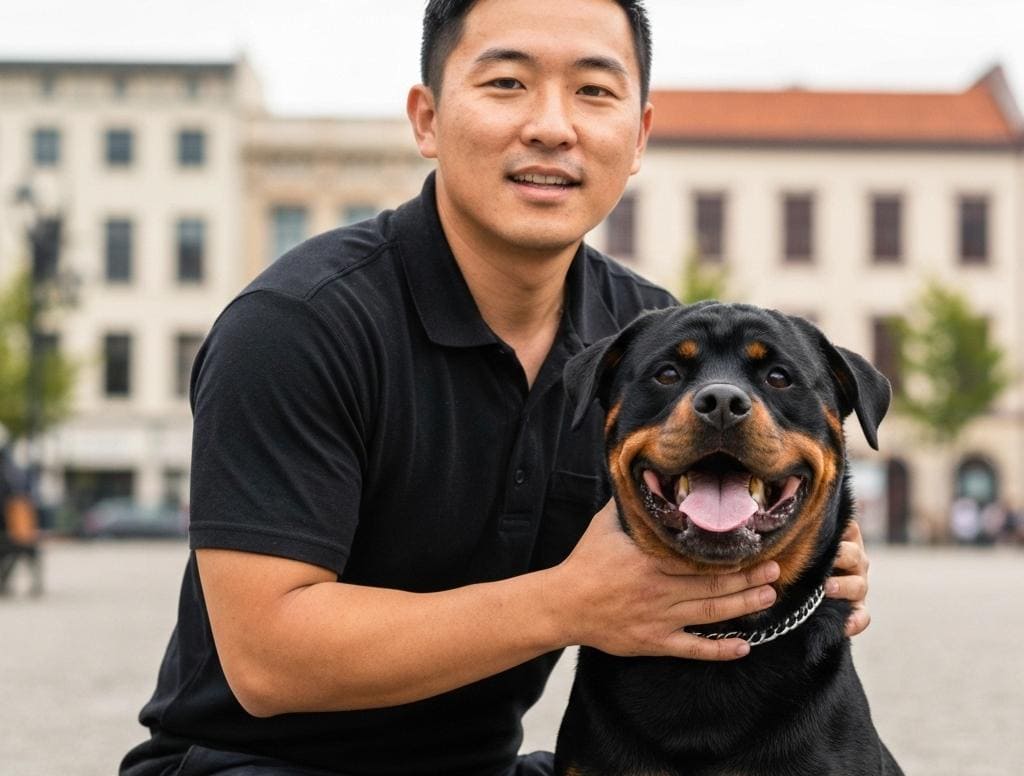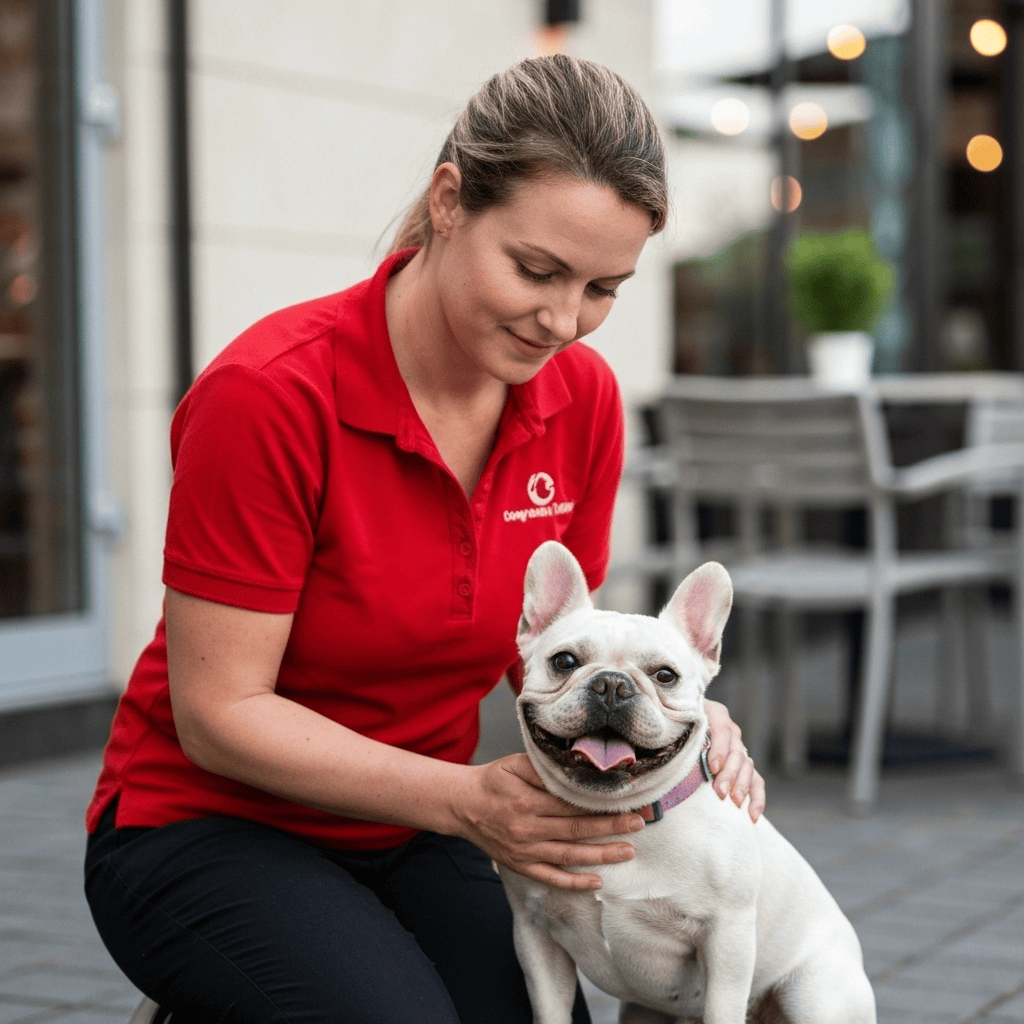Your Complete Guide to Choosing a Dog Trainer in Cleburne
Living with a dog in Cleburne means you’ll be walking through quiet neighborhoods, visiting Hulen Park on weekends, and maybe taking day trips to Cleburne State Park. Your dog needs to handle all of this calmly, and that’s where the right trainer makes all the difference.
When I talk to dog owners around Johnson County, they want the same things: a dog who walks nicely on leash, comes when called, and doesn’t embarrass them at the local coffee shop. The good news is that with the right approach, most dogs can learn these skills pretty quickly.
Finding a Trainer Who Actually Gets It
The best trainers in our area understand that your dog needs to work in the real world, not just in a sterile classroom. Look for someone who uses positive reinforcement methods and can help you practice in actual situations you’ll face around town.
You’ll want to ask about their experience with your specific goals. Maybe you need help with a reactive dog, or you’re starting with a brand new puppy, or your dog has separation anxiety when you head to work. Different trainers have different strengths.
If you want to understand what those letters after a trainer’s name actually mean, here are some helpful resources:
- Common dog trainer certifications explained in plain English
- What KPA-CTP training involves
- How CPDT-KA certification works
- For serious behavior issues, look into IAABC-CDBC or CBCC-KA credentials
One thing to consider: if you want to practice at local parks, ask how the trainer plans to progress from quiet backyard work to busier public spaces. And if you prefer in-home training, make sure they cover Johnson County and ask about any travel fees outside Cleburne city limits.
Different Training Approaches and What They Mean

Most good trainers around here focus on reward-based methods that build trust between you and your dog. Here’s what different types of training actually look like:
Basic obedience and manners covers the everyday stuff like sit, down, stay, walking on a leash, coming when called, and greeting people politely. This is what makes your dog pleasant to live with and take places.
Puppy training and socialization tackles house training, getting comfortable in a crate, appropriate chewing, and building confidence around new people, dogs, and situations. Starting early makes everything else easier.
Behavior modification is for more serious issues like fearfulness, reactivity toward other dogs, or aggression. These problems need careful, structured work using techniques like desensitization and counter-conditioning.
Private lessons and day training work well when group classes don’t fit your schedule or your dog gets too overwhelmed around other dogs. Board and train programs can give you a head start, but you’ll need follow-up work to maintain what your dog learned.
Stay away from trainers who rely on intimidation, shock collars, or punishment-based methods. Those approaches might suppress behavior temporarily, but they often create new problems and don’t teach your dog what you actually want them to do.
What You Can Expect to Pay
Training costs in Cleburne are generally more reasonable than what you’d find in central Dallas or Fort Worth, but prices vary based on the trainer’s experience and what’s included.
| Service Type | Cleburne Average | DFW Metro Average |
|---|---|---|
| Group classes 4-6 weeks | $140 – $220 | $170 – $280 |
| Private lessons 60 minutes | $90 – $140 | $110 – $170 |
| In-home dog training 60-90 minutes | $110 – $170 | $130 – $200 |
| Puppy training package 4-6 lessons | $320 – $550 | $380 – $620 |
| Day training per week | $400 – $750 | $500 – $900 |
| Board and train 2-4 weeks | $1,800 – $3,400 | $2,200 – $4,200 |
| Behavior consult initial | $120 – $200 | $150 – $250 |
Don’t just look at the bottom line price. Ask what’s included, how they measure progress, and whether there’s a free consultation so you can get a feel for their approach before committing.
Questions Worth Asking Before You Hire Anyone
- What specific methods do you use, and how do you help dogs learn without using fear or intimidation?
- Do you have experience with my particular situation, whether that’s reactivity, therapy dog preparation, or something else?
- What certifications or formal education do you have?
- How will you customize a program for my dog and my family’s needs?
- What training format do you recommend for us, and why?
- How will we work up to practicing around real distractions like busy parks or downtown areas?
- What’s the total investment, including any travel fees or extra costs?
- Do you carry liability insurance?
- If we run into behavior issues that might need veterinary input, how do you handle that?
- What kind of homework should I expect between sessions?
Local Rules That Matter for Dog Owners
Cleburne and Johnson County follow pretty standard Texas regulations, but it’s worth knowing what’s expected.
Leash requirements mean your dog needs to be under control in public spaces, with most parks requiring leashes. Rabies vaccination is required by state law, and keeping current tags on your dog helps Animal Services contact you if your dog gets loose.
Noise ordinances can come into play if your dog’s barking becomes a neighborhood issue. A good trainer can help you address excessive barking before it becomes a problem with the neighbors.
If your trainer wants to use public parks for group classes, they may need permits from the city.
For local specifics, check the City of Cleburne website. For vaccination requirements, the Texas DSHS Rabies Control page has current information.
Places to Practice Around Cleburne
Once your dog has some basic skills, these spots are great for practicing around real-world distractions.
Cleburne State Park offers trails and picnic areas where you can work on leash skills and recall in a controlled but interesting environment. Check the current pet policies at Cleburne State Park.
Remember to keep your dog leashed outside designated off-leash areas, bring really good treats, and work at a level where your dog can still pay attention to you.
What to Know About Trainer Credentials in Texas
Texas doesn’t require dog trainers to have a state license, which means the field is pretty much wide open. Responsible trainers carry liability insurance, and many facilities require proof of coverage.
When it comes to behavior work, hands-on experience and mentorship matter just as much as formal credentials. But certifications like KPA-CTP, CPDT-KA, IAABC-CDBC, and CBCC-KA show that a trainer has invested in their education and met certain standards.

Common Questions
How much does in-home dog training cost?
Around Cleburne, expect to pay $110 to $170 for a 60 to 90 minute session, depending on travel distance and the trainer’s experience level.
Is in-home dog training worth it?
It’s often the best option when you want help with problems that happen specifically at your house, like door manners, leash skills in your neighborhood, or separation anxiety. Working in your actual environment makes the training much more relevant.
Can you pay someone to house train your dog?
Yes, many trainers offer puppy programs that include house training guidance. The trainer can teach you the system and help troubleshoot problems, but the day-to-day consistency has to come from your family.
What is the 3-3-3 rule for dog training?
It’s a guideline for new dogs: roughly 3 days to start settling in, 3 weeks to learn your routine, and 3 months to feel truly at home. Training should start gently and gradually increase as your dog adjusts.
How long will it take to reach my training goals?
Basic manners like sit, stay, and loose leash walking typically take 4 to 8 weeks with consistent practice. Behavior issues like reactivity or aggression usually need several months of structured work.
What should I bring to group classes?
Pack a regular collar or harness, a 6-foot leash, small soft treats, water for your dog, and vaccination records if the trainer requests them. Leave retractable leashes at home during training.
What’s the leash law in Cleburne?
Dogs must be leashed and under control in public areas and parks. Specific rules can vary by location, so check the City of Cleburne website for current information.
Do I need a dog license in Cleburne or Johnson County?
Johnson County doesn’t issue county-wide dog licenses, and city requirements vary. Contact Cleburne Animal Services through the City of Cleburne website for current registration requirements.
What shots does my dog need in Johnson County or Texas?
Rabies vaccination is required by Texas law. Your veterinarian will recommend other core vaccines based on your dog’s age and lifestyle. See Texas DSHS Rabies Control for state requirements.
Are dog trainers required to be licensed in Cleburne or Johnson County or Texas?
No special trainer license is required. Look for trainers with business insurance and professional education like KPA-CTP, CPDT-KA, IAABC-CDBC, or CBCC-KA certifications.
Where can I practice off-leash recall?
Use fenced dog parks for safety. Fort Woof and ZBonz in Fort Worth, plus Burleson’s Bark Park, are all good options. Always follow posted rules and start during quieter times of day.
Which dog parks allow training around Cleburne?
Most dog parks welcome training as long as you’re respectful of other users and follow park rules. Fort Woof, ZBonz, and Burleson Bark Park all work well for recall and socialization practice.
What beaches or trails allow dogs for training?
We don’t have beaches here, but leashed dogs are welcome on trails at Cleburne State Park. For city parks and local trail options, check the City of Cleburne website.
Finding the right dog trainer comes down to humane methods, clear communication, and a plan that fits your life in Cleburne. Start with realistic goals, practice in short sessions, and gradually work up to the real-world situations you’ll face around town. With patience and the right guidance, most dogs can learn to be great companions in our community.
